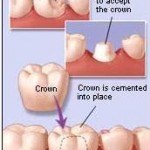Dental Crowns in Poland
 What is a dental crown?
What is a dental crown?
When dental crown may be needed?
- Preventing a weak tooth from breaking
- Holding parts of a broken tooth together
- Replacing a broken or a worn down tooth
- Supporting and covering a tooth with a significant Filling
- Holding a Dental Bridge in place
- Hiding misshaped or discolored teeth
- Replacing a lost tooth when placed on a Dental Implant
See more about cosmetic dentistry?in our? dental clinics in Lodz:
Dental Crowns in Poland Treatment
PRICES:
| Service | Lowest Price with DTP (GBP) | UK price (GBP) | Savings | Go to |
|---|---|---|---|---|
| Crown/Unit in a Bridge (porcelain fused to metal, price from) | £109 Lublin, Rzeszow | £400 | £291 73% | |
| Crown/Unit in a Bridge (full porcelain, price from) | £209 Lodz, Lublin | £600 | £391 65% |
TREATMENT TIME:
Before the crowns can be installed, you may need to get your teeth prepared. There may be a need for a root canal treatment or some dental fillings.
As for the duration, the first stage of the treatment will take 2-3 days. During that time we will get your teeth prepared and will take impressions for the crowns. If the teeth extraction is needed, it will also be done at the first stage of the treatment, and a temporary crown can be placed instead of the extracted tooth. After that, the dental laboratory needs around 5 working days to perform their work. The permanent crowns can be installed after that, and the installation itself requires an additional day. Bearing this in mind, the patient can consider two options:
1. One longer visit (5-8 days). If there is no need for any prior treatment, the visit duration can be shortened to 5 days.
2. Two shorter visits (2-3 days for the first one, and 1-2 days for the second visit). During the first visit all preparatory treatment will be done – root canal treatment, teeth extraction and temporary bridge/crowns installation. Impressions for the new permanent crowns will also be taken at this stage. ?The following visit can be scheduled 1 week later (or longer). The patient comes back for the permanent crowns installation.
READ MORE:
What are the crowns made of?
Permanent crowns can be made of various materials, starting from all metal ones, through porcelain fused to metal and ending at all porcelain or all resin.
All metal crowns
Crowns can be made of different types of metal such as gold or palladium, or base metal alloys such as nickel or chromium. Using metal crowns, less tooth structure needs to be removed compared to other types of crowns, and in the same time the tooth wear to opposite teeth is minimized.
Metal crowns are also known for lasting the longest as they can stand the chewing and the biting forces very well and are very difficult to break or chip. The only drawback from using the metal crowns is their metallic colour. Therefore they can be a good solution for molars that aren?�t visible.
Porcelain fused to metal crowns
Porcelain fused to metal crowns can match the natural teeth color. Something that was not possible using the metal crowns. Nevertheless, the risk of wear down caused by the opposing teeth is much higher with porcelain fused to metal crowns. In addition, the porcelain part is more subject to the risk of breaking or chipping. ?Porcelain fused to metal crowns can be a good solution for both front and back teeth as they resemble the natural teeth just like the ?All Ceramic crowns. The only difference is that using the porcelain fused to metal crowns a dark line can appear at the gum level indicating the underlying metal part.
All resin crowns
All resin crowns are the cheapest solution, but they are known for breaking and wearing down with time.
All ceramic/All porcelain crowns
All ceramic/All porcelain dental crowns are the best match for the natural teeth color, and are recommended for patients suffering from metal allergies. However, they are weaker than the Porcelain fused to metal crowns. Moreover they tend to wear down the opposing teeth more than resin or metal ones. ?All ceramic crowns are the best solution for the front teeth.
Temporary?crowns versus permanent crowns.
Preparation of temporary crowns can be can be done in the dentist?�s office while the permanent crowns are only made by a dental laboratory. Temporary crowns are used as a temporary replacement leaving time for the dental laboratory to prepare the permanent crown. The temporary crowns can be made of stainless steel or acrylic.
How do I have to care for my temporary dental crown?
The temporary dental crowns are a temporary solution installed for the time needed for the permanent crown to be prepared. Our dentists recommend to take precautions for the time when the temporary crown is in use. You should avoid sticky and chewy food such as chewing gum or caramel as it could pull the crown off. You should also try to use the other side of the mouth in order not to put the temporary crown at risk. Most of the chewing should be done by the other side of the mouth, where the crown is not fitted. Any hard food such as raw vegetables can also harm your temporary crown, therefore you should try to avoid it as they can misplace or even break the crown.
What issues can occur with a dental crown?
- Sensitivity and Discomfort. The most popular problems encountered after fitting new crowns are discomfort and sensitivity, especially straight after the anesthesia has worn off. The patient can be also sensitive to the cold or hot food, especially if the crowned teeth has a nerve in it. In such cases our dentists can recommend using a toothpaste designed for sensitive teeth. If the sensitivity or pain happens when you bite, it can mean that the crown is not properly adjusted to the tooth. You should then inform your dentist and your crown will be fitted.
- Chipped crown. Another problem that can happen to a porcelain crown is the risk of chipping. Depending on the size of the chip, various solutions can be applied. A small chip can be filled with composite resin without the need of crown removal. For a bigger chip, the patient may need the crown to be replaced.
- Loose crown. It happens sometimes that the cement washes out from under the crown, and it becomes loose. It also allows the bacteria to accumulate, and causes decay to the remaining tooth. If your crown is getting loose, you should contact your dentists.
- Crown falls off. Sometimes a crown can fall off. That can be caused by a lack of cement or an improper fitting. If it happens, clean the crown and the tooth. You can replace it temporarily with a temporary tooth, or using a dental adhesive. You can also find a special cement in stores. Please contact Dental Travel Poland immediately if that happens. Our ?dentists will instruct you on what to do with your crown and your tooth. They could also be able to put the crown back in place. If this is not possible, a new one will have to be made.
- Allergic reaction. An allergic reaction can occur given the fact that the dental crowns are made in most of the cases of a mix of metals. However, such a reaction is very rare.
- Dark line on the crowned tooth at the gum line. It is perfectly normal to see a dark line at the gum line ?especially when using a porcelain fused to metal crown. This dark line is the metal showing through the porcelain part of the crown.
How long does a dental crown last?
Most patients are able to use their dental crowns for 5 to 15 years. It depends on how the crown is worn and how it tears down. If the patient observes a proper oral hygiene and avoids any destructive habits such as grinding, clenching or chewing ice, the crown can last longer.
Is any special care required in regards to a crowned tooth?
You don?�t need to worry about any special care for your crowned tooth. Simply remember to observe a proper oral hygiene, and brush your teeth twice a day at minimum in order to prevent decay or gum disease.
Is it worth to get dental crowns in Poland?
Of course! Crowns in our country give you a chance for the best quality service and allow you to save some money. We offer dental crowns in Warsaw and dental crowns in Krakow as well as in our other locations in Poland.
- Dental veneers procedure step by step - October 5, 2018
- Dental Veneers – advantages and disadvantages - October 5, 2018
- Dental crowns vs dental fillings - April 6, 2018

 Posted by Marek in
Posted by Marek in 














